
Hickory is a common name for trees composing the genus Carya, which includes 19 species accepted by Plants of the World Online.

Carya ovata, the shagbark hickory, is a common hickory native to eastern North America, with two varieties. The trees can grow to quite a large size but are unreliable in their fruit output. The nut is consumed by wildlife and historically by Native Americans, who also used the wood.

Citheronia regalis, the regal moth or royal walnut moth, is a North American moth in the family Saturniidae. The caterpillars are called hickory horned devils. The adult (imago) has a wingspan of 3.75–6.1 in (9.5–15.5 cm). The species was first described by Johan Christian Fabricius in 1793.
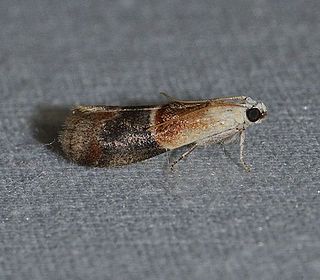
Acrobasis demotella, the walnut shoot moth, is a moth of the family Pyralidae described by Augustus Radcliffe Grote in 1881. It is found in North America, from Ontario south to North Carolina and west to Missouri and Michigan.
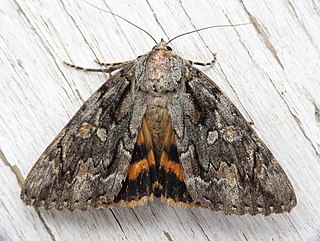
Catocala neogama, the bride, is a moth in the family Erebidae first described by James Edward Smith in 1797. It is found in North America east of the Rocky Mountains, from Maine and Quebec south to northern Florida and west to South Dakota, New Mexico, and into Arizona and Texas. Its westernmost population from the semiarid Colorado Plateau region is rather distinct and was once considered a separate species, but is now regarded as a well-marked subspecies C. n. euphemia.

Catocala angusi, commonly known as Angus' underwing, is a species of moth in the family Erebidae. It is found from Massachusetts and Connecticut south to Georgia west to Arkansas and Kansas and north to Illinois and Michigan.

Catocala obscura, the obscure underwing, is a moth of the family Erebidae. The species was first described by Ferdinand Heinrich Hermann Strecker in 1873. In Canada it is found in southern Quebec and Ontario and in the United States it is found from Massachusetts and Connecticut south to North Carolina, west to Mississippi and north to Iowa, Illinois, Ohio, and Michigan.
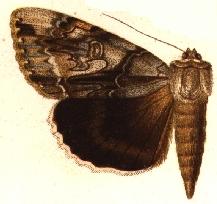
Catocala vidua, the widow underwing, is a moth of the family Erebidae. The species was first described by James Edward Smith in 1797. It is found in North America from southern Ontario, into Maine, New Hampshire and Connecticut, south at least to Tennessee, Georgia and Alabama, west to Texas and Oklahoma, and north to Wisconsin.

Catocala flebilis, the mourning underwing, is a moth of the family Erebidae. The species was first described by Augustus Radcliffe Grote in 1872. It is found in North America from Massachusetts and Connecticut south to North Carolina and Georgia, west to Arkansas and north to Michigan and Illinois and into southern Ontario.

Catocala maestosa, commonly known as the sad underwing, is a species of moth in the family Erebidae. The species was first described by George Duryea Hulst in 1884. It is found in the United States from New York south to Florida and Alabama, west to Texas and eastern Oklahoma and north to Illinois, Indiana and Minnesota.
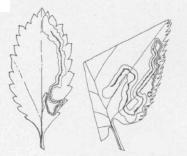
Stigmella ostryaefoliella is a moth of the family Nepticulidae. It is found in North America in Ohio, New Jersey, New York, Florida and Ontario.
Acrocercops transecta is a moth of the family Gracillariidae. It is known from Japan, Korea, the Russian Far East and Taiwan.
Acrobasis kearfottella, Kearfott's acrobasis moth, is a species of snout moth in the genus Acrobasis. It was described by Harrison Gray Dyar Jr. in 1905, and is known from Quebec, Canada, and the eastern United States.

Acrobasis caryalbella is a species of snout moth in the genus Acrobasis. It was described by Charles Russell Ely in 1913 and is known from the eastern United States.

Acrobasis palliolella, the mantled acrobasis moth, is a species of snout moth in the genus Acrobasis. It was described by Ragonot in 1887, and is known from Ontario, Canada, and the eastern United States.

Acrobasis angusella, the hickory leafstem borer or leafstem borer, is a species of snout moth. It was described by Augustus Radcliffe Grote in 1880, and is known from Quebec, Canada, and the north-eastern United States.
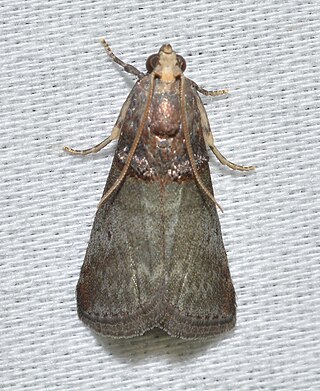
Acrobasis stigmella is a species of snout moth in the genus Acrobasis. It was described by Harrison Gray Dyar Jr. in 1908, and is known from Ontario, Canada, and the eastern United States.

Acrobasis caryae, the hickory shoot borer, is a species of snout moth in the genus Acrobasis. It was described by Augustus Radcliffe Grote in 1881, and is known from southeastern Ontario, Canada, and the eastern United States.

Argyrotaenia juglandana, the hickory leafroller moth, is a species of moth of the family Tortricidae. It is found in North America, where it has been recorded from Alabama, Arkansas, Florida, Illinois, Indiana, Kentucky, Louisiana, Maryland, Mississippi, Missouri, New Hampshire, New York, North Carolina, Ohio, Ontario, Pennsylvania, Quebec, Tennessee, Texas, West Virginia and Wisconsin. The habitat consists of deciduous woodlands and parks where hickory grows.
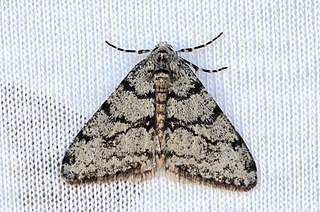
Apocheima strigataria, the small phigalia moth, is a moth of the family Geometridae. The species was first described by Charles Sedgwick Minot in 1869. It is found in North America, where it has been recorded from North Dakota to Texas and further east. The habitat consists of woodlands and forests.

















